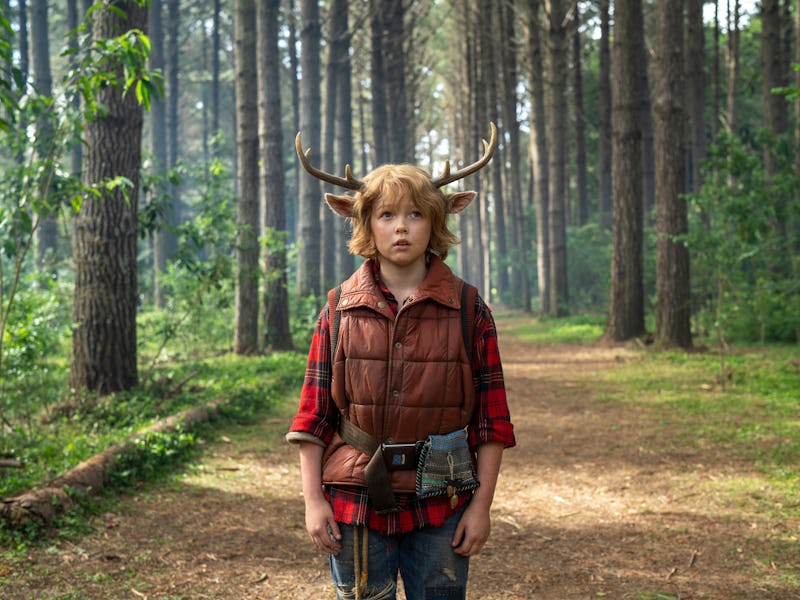Sweet Tooth is a pandemic post-apocalypse literally nobody asked for
Even if it wasn’t coming way too soon, Netflix’s new sci-fi series would still be a dud.

A virus spreads across the Earth at unimaginable speed, flooding hospitals and killing millions as civilization grinds to a halt. The survivors are forced to wear masks as their fear transforms into violence wielded against an easy scapegoat. A cruel and incapable government does little to help the situation or extinguish the flame of that violence.
If your eyes glazed over at that last paragraph, I don’t blame you. We’ve all spent the last 14 months dealing with a once-in-a-lifetime pandemic. As vaccinations begin to beat back the disease, the last thing anyone needs is a shot-for-shot retelling of the worst year of many of our lives. Which is why I cannot for the life of me figure out why Netflix thought it was a good idea to release Sweet Tooth.
The new series, created by Jim Mickle and based on a comic from DC’s mature offshoot Vertigo, tells the story of a pandemic-ridden, post-apocalyptic America. As the virus spreads, new children are born with animal features. It’s unclear which came first, “the sick” or these “Hybrids,” but their clear connection drives many to fear Hybrids and some to even try to kill them.
It’s in this world that we meet Gus (aka Sweet Tooth), a young boy with antlers and deer ears that give him ultra-sensitive hearing and smell (even though he has a human nose ¯\_(ツ)_/¯). Gus sets out on a cross-country adventure with Tommy Jepperd, a hulking former athlete and reformed Hybrid “poacher” who becomes Sweet Tooth’s begrudging guardian.
The trials of Gus and Tommy are entertaining enough, even if Sweet Tooth has the same flattened digital look of every other second-rate Netflix original series. But what sets the show apart — and also makes it nearly unwatchable — is its insistence on chronicling the spread of the virus through a series of increasingly painful flashbacks.
The story of the pandemic is mostly told through Dr. Singh and his wife.
The show opens as the virus first emerges, and we see it through the eyes of Dr. Aditya Singh as his hospital becomes overwhelmed by coughing patients. In the third episode, set years after the outbreak, Singh and his remaining friends gather for a party. When it’s revealed that the host is sick, too, the guests quickly turn on him, matter of factly pulling face masks out of their pockets before doing something truly horrific to stop the disease from spreading.
Sweet Tooth should come with a trigger warning. Instead, it’s presented in trailers and promotional material as a heart-warming adventure. It’s no surprise that out of 50 press images provided by Netflix, I couldn’t find a single one showing any of these flashback scenes in detail.
The original comic is also significantly darker in its portrayal of the post-apocalypse, but executive producer Robert Downey Jr. and his team decided to “make it a more enjoyable place.” So why couldn’t they change the virus plotline? Even Marvel’s The Falcon and the Winter Soldier seemingly swapped out a pandemic subplot at the last minute. Apparently, Netflix didn’t get that message.
“We were two months into our writers’ room when, suddenly, we found ourselves on Zoom, writing a show that felt more like reality than fiction,” co-creators Mickle and Beth Schwartz write in a statement.
Maybe there was a moment when someone in that writers’ room suggested not turning the real-life pain of billions into a bingeable sci-fi show. Maybe not. Either way, that’s exactly what we got.
There’s nothing unique or thoughtful enough in Sweet Tooth to balance out the show’s sheer unpleasantness.
Sweet Tooth has eight episodes (at least in Season 1), but I couldn’t make it past Episode 4. I’m just not ready to watch the minute details of life during a pandemic become fodder for a post-apocalypse story. Especially such a mediocre one.
It would be one thing if the core tale of Gus and Tommy was good enough to merit its backstory. It’s not. Christian Convery (Gus) is decent as far as child actors go, and Nonso Anozie (Tommy) is entertaining to watch as a one-man killing machine. But from what I’ve seen, there’s nothing unique or thoughtful enough in Sweet Tooth to balance out the show’s sheer unpleasantness.
Maybe in a few years I’ll feel different. For now, there are better things to do than watch a dramatized version of the Covid-19 pandemic tossed thoughtlessly in front of our eyeballs like one more forgettable Netflix original.
Sweet Tooth releases June 4 on Netflix.
This article was originally published on